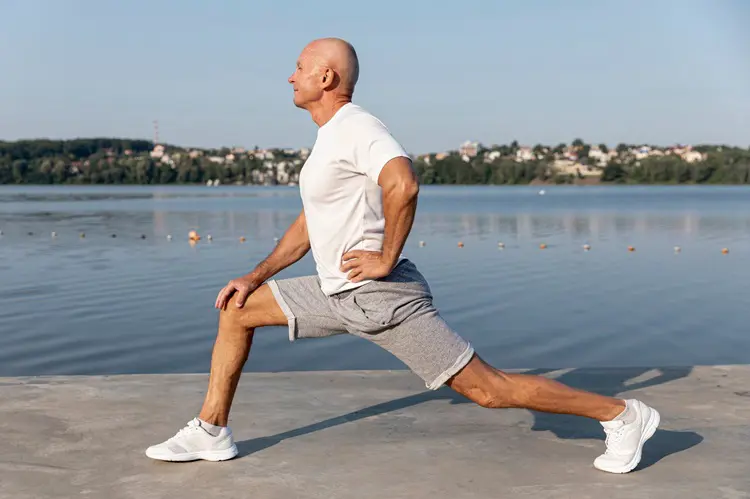15 Walking Benefits To Make You Lace Up Your Shoes

Walking is one of the simplest and most accessible forms of exercise, offering a wealth of health benefits. Incorporating a walk into your daily routine can significantly enhance digestion, improve sleep, and extend your lifespan.
Here are 15 walking benefits that will have you lacing up your shoes in no time:
1. Aids in Weight Loss

One easy activity to start your weight loss journey is walking. Walking for about 30 to 60 minutes daily helps burn calories and might even result in long-term weight loss.
Your body will start torching that fat and boosting metabolism, which ultimately helps to maintain a healthy body weight.
2. Improves Digestion

Walking is useful for digestion and gut care. A short walk after eating promotes the digestive system and allows for easy passage of food through the intestines.
Regular practice could also reduce bacteria in the gut, helping the immune system improve nutrient absorption.
3. Lower Blood Pressure

Although walking may seem quite simple, it is considered one of the best exercises for blood pressure. A 30 to 40 minute walk can lower both systolic and diastolic blood pressure.
Practicing this improves the capability to pump blood and reduces arterial stress. This helps relieve the difficulties of high blood pressure and boost heart health.
4. Helps You Sleep Well

Since walking lowers tension and anxiety, it is one of the best methods for enhancing sleep. This facilitates sleep, which is beneficial to general health.
Endorphins released during a brief walk contribute to an increase in body relaxation levels. Even walking outside during the day improves mood and sleep quality.
5. Strengthens Muscles

Want to be fit without going to the gym? Regular walking can be the ideal technique. Every step taken involves different engagement of leg muscles, hamstrings, glutes, and calves. The more you walk over time, the more these muscles will develop by getting bigger and more defined.
You can also get a great workout by increasing your pace and incorporating uphill routes. It is the right way to upgrade your strength and endurance in the muscles of the body
6. Enhances Creative Thinking

Walking also helps you gain a healthy and peaceful mind, think creatively, and boost productivity. It refreshes both your mind and body, allowing you to reset your mental health.
Everyday walking improves memory and allows one to have better cognition. Walking can also increase a person's creative side and cultivate a healthy, positive mindset.
7. Increases Lung Capacity

One of the easiest and most effective methods of increasing lung capacity is walking. Walking forces your lungs to work harder by taking in a greater amount of oxygen, eventually working out the muscles used for breathing.
This gradual improvement in lung function improves the overall health of your respiratory system and endurance.
8. Boosts Cardiovascular Health

Daily walking for 30 to 60 minutes can improve the functioning of the heart and blood circulation system. This will make the heart pump blood effectively to reduce the risks of heart disease and stroke.
According to a study done by Preventing Chronic Disease in May 2019, Promoting walking may be a way to help adults avoid inactivity and encourage an active lifestyle for CVD prevention and management.
9. Enhances Mood

Walking is an excellent way to lift the mood and boost energy. It releases happy hormones or endorphins into the body and works to lower stress levels.
A brisk walk outdoors is a nice break from daily life to refocus and refresh the mind. The rhythmic pace of walking makes you more aware and focused on the present moment.
10. Promotes Joint Flexibility

It is good for maintaining natural body motion and makes the joints flexible. Every step of walking lubricates the joints and increases their range of motion.
This can be great for anyone of any age because it is gentle on the knees, hips, and ankles. Regular walking develops all the muscles around your joints, increasing stability and support.
11. Boosts Your Brainpower

Among walking benefits, boosting your brainpower is also one of them. Regular walking improves cognitive abilities such as concentration, enhanced memory, and capacity to solve problems.
Moreover, it is also known to produce hormones that uplift the development of new neurons, which is helpful in the proper function of the brain.
12. Extends Your Lifespan

Walking is a perfect activity for your future and present health. It lowers the risks of chronic diseases such as diabetes, heart disease, and cancer. Brisk walking daily can improve overall health and allow one to become more energetic.
It also boosts psychological health, which is a huge factor in maintaining good health. A much healthier lifestyle and great mindset enable full capacity for enjoyment in life.
13. Boosts Immune Function

One of the easiest but most efficient techniques for improving immune function involves walking. Frequent practice provides good blood flow, enabling easy movement of the immune cells in the body. The good flow of blood aids in preventing illness through better facilitation of your immune cells.
It will also reduce the impact of stress, which is one contributor to weakening immune function. Put on those walking shoes and let your immunity become stronger and healthier!
14. Reduces Sugar Cravings

Regular walking regulates the blood sugar level, reducing the chances of craving sugary foods for sudden energy boosts.
Walking also releases endorphins, which elevate your mood and lessen the need for foods loaded with sugar. A small walk may also be an excellent diversion to help you release food cravings while focusing on much healthier choices.
15. Helps Ease Your Eye Pain

Most of the people spend their free time looking at the screens of the mobile phones and laptops. Walking can help the eye rest and relax by providing a break from these devices.
Normally, being out of the house helps to expose your eyes to natural light, which automatically reduces eye strain. Plus, it also increases blood flow to the body, including the eyes.
How Long Should You Walk?
The length of your walk depends on your present level of activity and exercise goals. If you are seeking some basic health benefits, then 30 minutes of moderate-intensity walking is fine. You can extend it up to 45-60 minutes daily for weight loss, which would boost your calorie burning and help with your metabolism.
The walks should be 10 to 15 minutes for beginners and extended as stamina goes up. Ultimately, the best duration is one that fits into your lifestyle and allows you to enjoy walking consistently!
Disclaimer: The details provided in this article are for educational purposes only. They should not be considered as a medical advice.
Recent posts
Exercises
Exercises
12 Simple Rotator Cuff Exercises For Conditioned Shoulders
The rotator cuffs are a key muscle group, crucial for a wide range of arm movements and for stabilizing the shoulder joint. When we’re rotating or lifting our arms, the rotator cuffs are working hard. Weakness in these muscles can lead to...
Exercises
12 Amazing Full Body Dumbbell Workout And Exercises
If you're new to fitness, putting together a full-body workout can feel overwhelming. A solid training program targets strength, endurance, flexibility, and balance while working all the major muscle groups. Luckily, dumbbells are versatile tools tha...
Exercises
11 Effective Jawline Exercises To Try For A Chiseled Face
Jawline exercises can lead to changes in the shape of the face, resulting in fuller cheeks and a more youthful appearance. Exercising the neck, chin, jaw, and other facial muscles leads to sharper cheekbones and a prominent jawline. Improving your ja...
Exercises
15 Best Exercises For Waist To Get A Slimmer Midsection
Smaller waist is a common goal for many women, but it requires a mix of exercise, persistence, and a healthy lifestyle. Waist-slimming workouts will tone and shape your midsection while also improving your overall posture and stability. From easy twi...
Exercises
16 Body Weight Leg Exercises To Strengthen Your Lower Body
Bodyweight training is very accessible, popular, and requires little or no equipment at all. With bodyweight exercises, you can target your lower body muscles in different ways to help build stronger legs. Before jumping into weighted movements, thes...
Exercises
12 Achilles Tendon Stretches To Tone Heel And Calf Muscles
The Achilles tendon runs down the back of the lower leg, connecting the heel bone to the calf muscle. It helps lift the heel off the ground while walking. If you suffer from Achilles tendonitis, gently working out the inflamed tendons can aid in quic...






